Unit 2 Daily life Grammar课件(共20张PPT)
文档属性
| 名称 | Unit 2 Daily life Grammar课件(共20张PPT) |  | |
| 格式 | pptx | ||
| 文件大小 | 727.0KB | ||
| 资源类型 | 教案 | ||
| 版本资源 | 牛津深圳版 | ||
| 科目 | 英语 | ||
| 更新时间 | 2021-09-19 11:45:02 | ||
图片预览

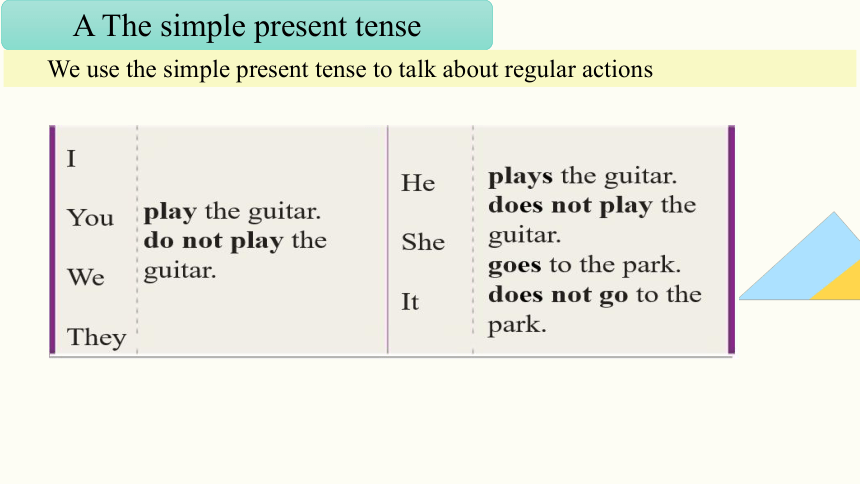
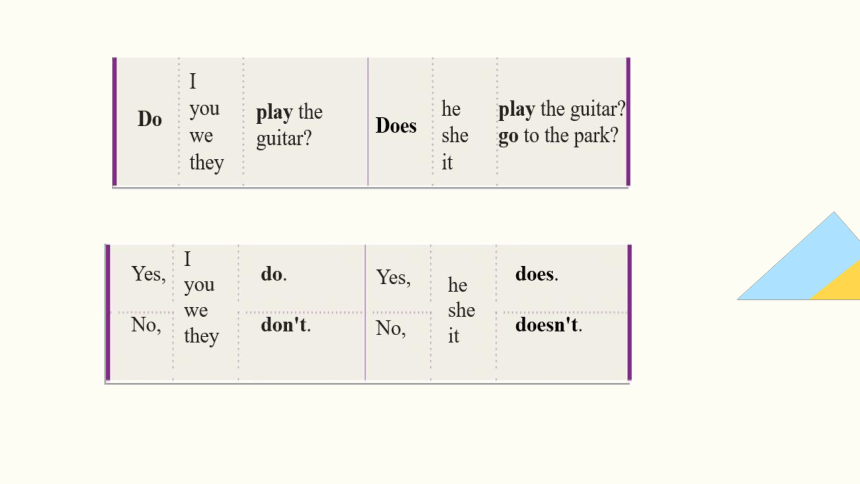
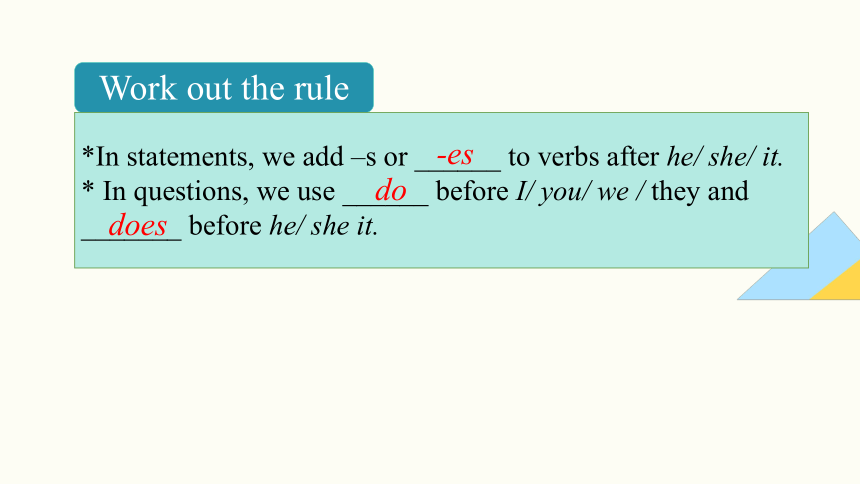
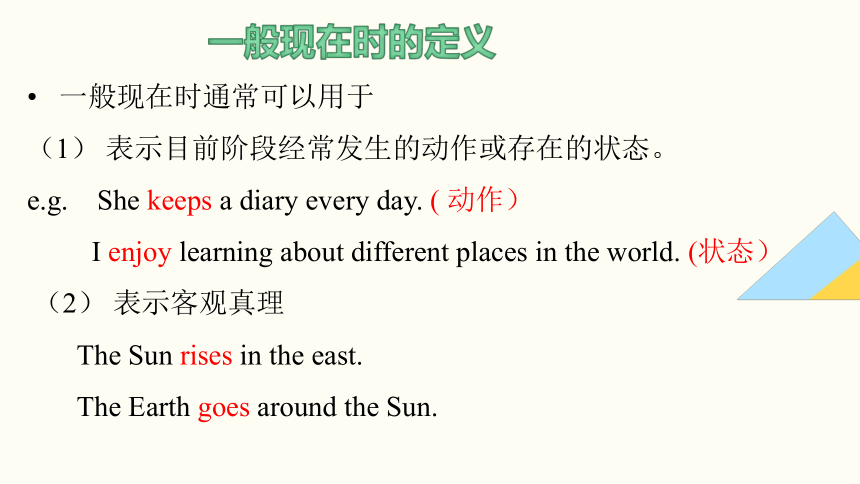
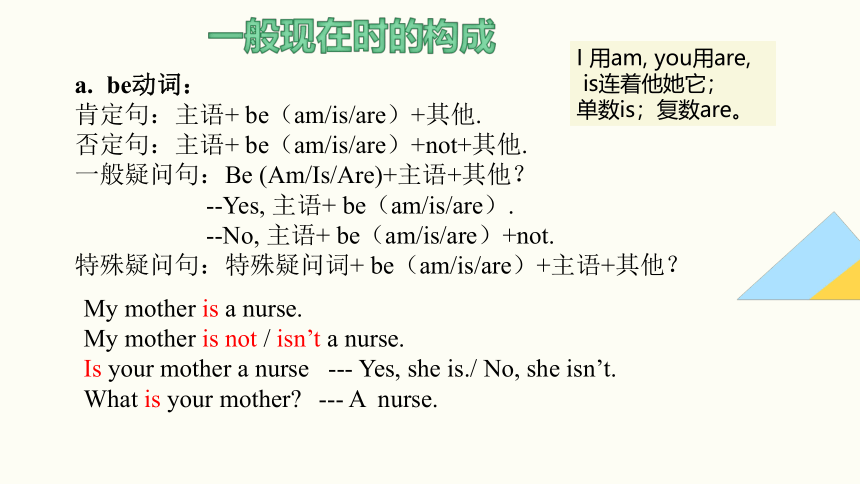
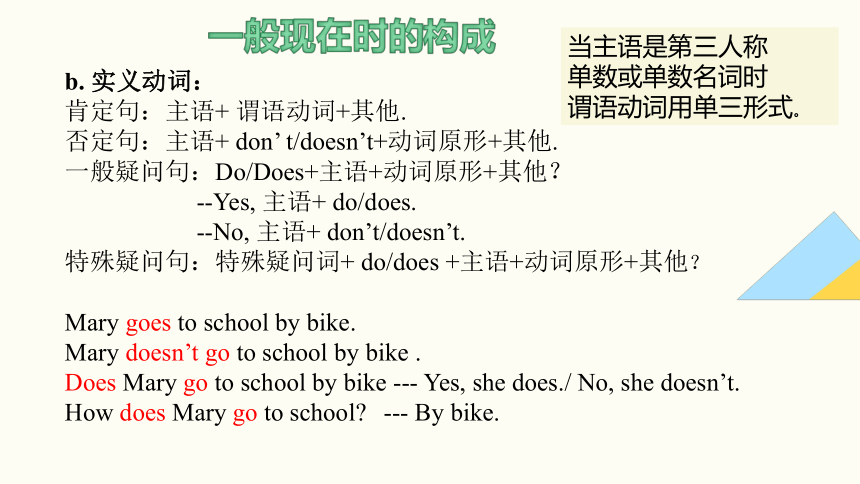
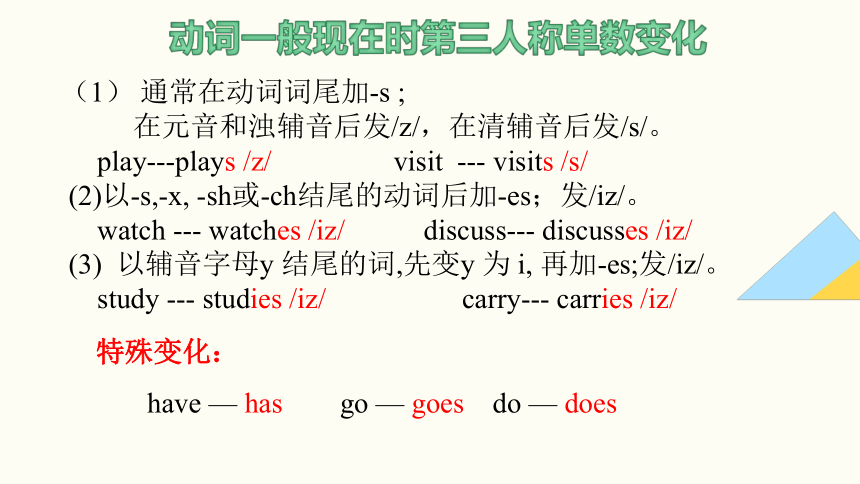
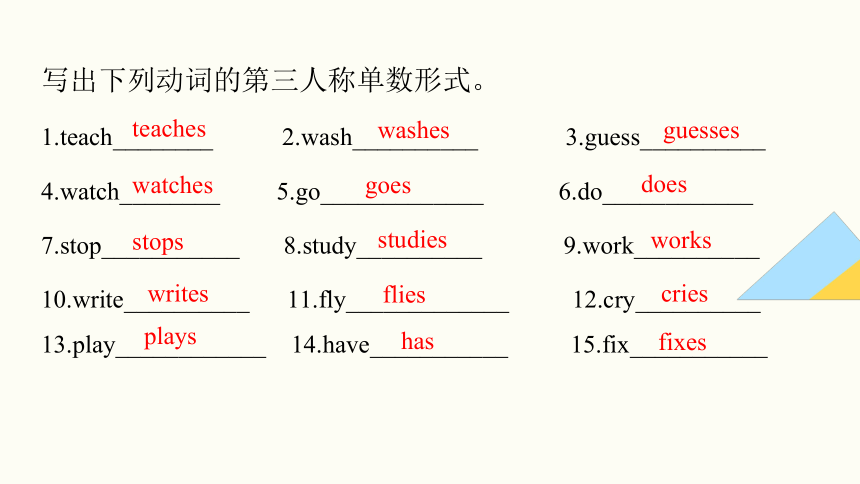
文档简介
(共20张PPT)
广州牛津版七年级上册
Unit
2
Daily
life
Grammar
A
The
simple
present
tense
We
use
the
simple
present
tense
to
talk
about
regular
actions
Work
out
the
rule
In
statements,
we
add
–s
or
______
to
verbs
after
he/
she/
it.
In
questions,
we
use
______
before
I/
you/
we
/
they
and
_______
before
he/
she
it.
-es
do
does
一般现在时通常可以用于
(1)
表示目前阶段经常发生的动作或存在的状态。
e.g.
She
keeps
a
diary
every
day.
(
动作)
I
enjoy
learning
about
different
places
in
the
world.
(状态)
(2)
表示客观真理
The
Sun
rises
in
the
east.
The
Earth
goes
around
the
Sun.
一般现在时的定义
一般现在时的构成
be动词:
肯定句:主语+
be(am/is/are)+其他.
否定句:主语+
be(am/is/are)+not+其他.
一般疑问句:Be
(Am/Is/Are)+主语+其他?
--Yes,
主语+
be(am/is/are).
--No,
主语+
be(am/is/are)+not.
特殊疑问句:特殊疑问词+
be(am/is/are)+主语+其他?
I
用am,
you用are,
is连着他她它;
单数is;复数are。
My
mother
is
a
nurse.
My
mother
is
not
/
isn’t
a
nurse.
Is
your
mother
a
nurse
---
Yes,
she
is./
No,
she
isn’t.
What
is
your
mother?
---
A
nurse.
一般现在时的构成
b.
实义动词:
肯定句:主语+
谓语动词+其他.
否定句:主语+
don’
t/doesn’t+动词原形+其他.
一般疑问句:Do/Does+主语+动词原形+其他?
--Yes,
主语+
do/does.
--No,
主语+
don’t/doesn’t.
特殊疑问句:特殊疑问词+
do/does
+主语+动词原形+其他?
当主语是第三人称
单数或单数名词时
谓语动词用单三形式。
Mary
goes
to
school
by
bike.
Mary
doesn’t
go
to
school
by
bike
.
Does
Mary
go
to
school
by
bike
---
Yes,
she
does./
No,
she
doesn’t.
How
does
Mary
go
to
school?
---
By
bike.
(1)
通常在动词词尾加-s
;
在元音和浊辅音后发/z/,在清辅音后发/s/。
play---plays
/z/
visit
---
visits
/s/
(2)以-s,-x,
-sh或-ch结尾的动词后加-es;发/iz/。
watch
---
watches
/iz/
discuss---
discusses
/iz/
(3)
以辅音字母y
结尾的词,先变y
为
i,
再加-es;发/iz/。
study
---
studies
/iz/
carry---
carries
/iz/
动词一般现在时第三人称单数变化
特殊变化:
have
—
has
go
—
goes
do
—
does
写出下列动词的第三人称单数形式。
1.teach________
2.wash__________
3.guess__________
4.watch________
5.go_____________
6.do____________
7.stop___________
8.study__________
9.work__________
10.write__________
11.fly_____________
12.cry__________
13.play____________
14.have___________
15.fix___________
teaches
washes
guesses
watches
goes
does
stops
studies
works
writes
flies
cries
plays
has
fixes
A1
Use
the
information
in
the
article
on
P17
to
complete
the
conversation
below.
S1:
(1)
________
Sam
_______
(go)
to
school
by
bus?
S2:
No,
he
(2)
_________.
He
(3)
______
(go)
to
school
on
foot.
S1:
(4)
_______
Sam
and
his
friends
______
(play)
games
during
the
morning
break?
S2:
Yes,
they
(5)
________.
S1:
What
(6)
_______
Sam
______
(do)
after
school?
S2:
He
(7)
________
(take)
part
in
the
school
band
practice.
Does
go
doesn’t
goes
Do
play
do
does
do
takes
A1
In
pairs,
talk
about
the
things
in
the
box.
Follow
the
example.
go
to
school
by
bus
study
Chinese,
Maths
and
English
in
the
morning
take
part
in
after-school
activities
B
Adverbs
and
adverbial
phrases
of
frequency
We
use
adverbs
and
adverbial
phrases
of
frequency
to
talk
about
how
often
things
happen.
Adverbs
of
frequency
(频度副词)
I
always/
usually/
often
sometimes/
seldom/
never
go
to
school
on
foot.
always,
usually,
often,
sometimes,
seldom,
never
等频度副词用于描述动作或事件发生的频率,它们表示的频率依次递减.
Adverbial
phrases
of
frequency
(频度副词短语)
I
go
to
the
English
Club
Work
out
the
rule
1.
Adverbs
of
frequency
come
(before/after)
the
main
verbs.
2.
Adverbial
phrases
of
frequency
often
come
(in
the
middle/at
the
end)
of
a
sentence.
Sometimes
they
come
at
the
beginning.
every
day.
twice
a
week.
On
Saturdays,
Once
a
month,
I
go
to
the
park.
1.
频度副词用于be动词、情态动词及助动词之后,行为动词之前。
She
is
never
late
for
school.
I
sometimes
go
to
school
by
bus.
2.
频度副词短语常置于句末,有时也置于句首。
We
go
to
the
cinema
once
a
month.
Every
Saturday
afternoon,
I
play
basketball
with
my
friends.
Mandy:
Sam:
Mandy:
Sam:
Mandy:
Sam:
Mandy:
Sam:
Mandy:
Sam:
Mandy:
Sam:
How
often
do
you
watch
television?
(1)_______________________________________(every
night)
How
often
do
you
eat
out?
(2)
_______________________________________
(sometimes)
How
often
do
you
play
table
tennis
with
your
father?
(3)
_______________________________________
(once
a
week)
How
often
do
you
win?
(4)
_________________________________________
(seldom)
How
often
do
you
visit
other
cities?
(5)
__________________________________
(four
times
a
year)
How
often
do
you
play
computer
games?
(6)
__________________________________________
(never)
I
sometimes
eat
out.
I
watch
television
every
night.
I
play
table
tennis
with
my
father
once
a
week.
I
seldom
win.
I
visit
other
cities
four
times
a
year.
I
never
play
computer
games.
Mandy
meets
Sam
on
the
Internet
again.
She
is
asking
Sam
some
questions
about
his
life.
Write
Sam’s
answers
in
complete
sentences.
一、选择题。
1.
Mary
________
to
work
by
car.
A.
usually
go
B.
go
usually
C.
usually
goes
D.
goes
usually
2.
________
your
e-friend
_______
in
Beijing?
Do;
live
B.
Do;
lives
C.
Does;
live
D.
Does;
lives
3.
Light
________
much
faster
than
sound.
travel
B.
travels
C.
travelled
D.
is
travelling
4.
Tom
gets
up
early
every
day.
He
is
________
late
for
school.
sometimes
B.
always
C.
often
D.
never
5.
______
your
sister
good
at
________?
A.
Is;
dance
B.
Is;
dancing
C.
Does;
dance
D.
Do;
dancing
二、根据中文意思完成句子。
1.
我从不撒谎。
I
______
tell
lies.
2.
他很少参加活动,因为他总是忙于学习。
He
______
______
part
in
the
activities,
because
he
_______
_______
busy
studying.
3.
王先生每个月去爬山一次。
Mr.
Wang
______
climbing
______
______
______.
4.
小汤姆每晚睡觉前都刷牙。
Little
Tom
_______
______
______
before
going
to
bed
every
night.
5.
我们经常步行去上学。
We
often
______
to
school
_____
____.
never
seldom
takes
is
always
goes
once
a
month
brushes
his
teeth
go
on
foot
Homework
。
1.
熟知一般现在时的定义和用法;
2.
完成对应练习。
Homework
THANKS
广州牛津版七年级上册
Unit
2
Daily
life
Grammar
A
The
simple
present
tense
We
use
the
simple
present
tense
to
talk
about
regular
actions
Work
out
the
rule
In
statements,
we
add
–s
or
______
to
verbs
after
he/
she/
it.
In
questions,
we
use
______
before
I/
you/
we
/
they
and
_______
before
he/
she
it.
-es
do
does
一般现在时通常可以用于
(1)
表示目前阶段经常发生的动作或存在的状态。
e.g.
She
keeps
a
diary
every
day.
(
动作)
I
enjoy
learning
about
different
places
in
the
world.
(状态)
(2)
表示客观真理
The
Sun
rises
in
the
east.
The
Earth
goes
around
the
Sun.
一般现在时的定义
一般现在时的构成
be动词:
肯定句:主语+
be(am/is/are)+其他.
否定句:主语+
be(am/is/are)+not+其他.
一般疑问句:Be
(Am/Is/Are)+主语+其他?
--Yes,
主语+
be(am/is/are).
--No,
主语+
be(am/is/are)+not.
特殊疑问句:特殊疑问词+
be(am/is/are)+主语+其他?
I
用am,
you用are,
is连着他她它;
单数is;复数are。
My
mother
is
a
nurse.
My
mother
is
not
/
isn’t
a
nurse.
Is
your
mother
a
nurse
---
Yes,
she
is./
No,
she
isn’t.
What
is
your
mother?
---
A
nurse.
一般现在时的构成
b.
实义动词:
肯定句:主语+
谓语动词+其他.
否定句:主语+
don’
t/doesn’t+动词原形+其他.
一般疑问句:Do/Does+主语+动词原形+其他?
--Yes,
主语+
do/does.
--No,
主语+
don’t/doesn’t.
特殊疑问句:特殊疑问词+
do/does
+主语+动词原形+其他?
当主语是第三人称
单数或单数名词时
谓语动词用单三形式。
Mary
goes
to
school
by
bike.
Mary
doesn’t
go
to
school
by
bike
.
Does
Mary
go
to
school
by
bike
---
Yes,
she
does./
No,
she
doesn’t.
How
does
Mary
go
to
school?
---
By
bike.
(1)
通常在动词词尾加-s
;
在元音和浊辅音后发/z/,在清辅音后发/s/。
play---plays
/z/
visit
---
visits
/s/
(2)以-s,-x,
-sh或-ch结尾的动词后加-es;发/iz/。
watch
---
watches
/iz/
discuss---
discusses
/iz/
(3)
以辅音字母y
结尾的词,先变y
为
i,
再加-es;发/iz/。
study
---
studies
/iz/
carry---
carries
/iz/
动词一般现在时第三人称单数变化
特殊变化:
have
—
has
go
—
goes
do
—
does
写出下列动词的第三人称单数形式。
1.teach________
2.wash__________
3.guess__________
4.watch________
5.go_____________
6.do____________
7.stop___________
8.study__________
9.work__________
10.write__________
11.fly_____________
12.cry__________
13.play____________
14.have___________
15.fix___________
teaches
washes
guesses
watches
goes
does
stops
studies
works
writes
flies
cries
plays
has
fixes
A1
Use
the
information
in
the
article
on
P17
to
complete
the
conversation
below.
S1:
(1)
________
Sam
_______
(go)
to
school
by
bus?
S2:
No,
he
(2)
_________.
He
(3)
______
(go)
to
school
on
foot.
S1:
(4)
_______
Sam
and
his
friends
______
(play)
games
during
the
morning
break?
S2:
Yes,
they
(5)
________.
S1:
What
(6)
_______
Sam
______
(do)
after
school?
S2:
He
(7)
________
(take)
part
in
the
school
band
practice.
Does
go
doesn’t
goes
Do
play
do
does
do
takes
A1
In
pairs,
talk
about
the
things
in
the
box.
Follow
the
example.
go
to
school
by
bus
study
Chinese,
Maths
and
English
in
the
morning
take
part
in
after-school
activities
B
Adverbs
and
adverbial
phrases
of
frequency
We
use
adverbs
and
adverbial
phrases
of
frequency
to
talk
about
how
often
things
happen.
Adverbs
of
frequency
(频度副词)
I
always/
usually/
often
sometimes/
seldom/
never
go
to
school
on
foot.
always,
usually,
often,
sometimes,
seldom,
never
等频度副词用于描述动作或事件发生的频率,它们表示的频率依次递减.
Adverbial
phrases
of
frequency
(频度副词短语)
I
go
to
the
English
Club
Work
out
the
rule
1.
Adverbs
of
frequency
come
(before/after)
the
main
verbs.
2.
Adverbial
phrases
of
frequency
often
come
(in
the
middle/at
the
end)
of
a
sentence.
Sometimes
they
come
at
the
beginning.
every
day.
twice
a
week.
On
Saturdays,
Once
a
month,
I
go
to
the
park.
1.
频度副词用于be动词、情态动词及助动词之后,行为动词之前。
She
is
never
late
for
school.
I
sometimes
go
to
school
by
bus.
2.
频度副词短语常置于句末,有时也置于句首。
We
go
to
the
cinema
once
a
month.
Every
Saturday
afternoon,
I
play
basketball
with
my
friends.
Mandy:
Sam:
Mandy:
Sam:
Mandy:
Sam:
Mandy:
Sam:
Mandy:
Sam:
Mandy:
Sam:
How
often
do
you
watch
television?
(1)_______________________________________(every
night)
How
often
do
you
eat
out?
(2)
_______________________________________
(sometimes)
How
often
do
you
play
table
tennis
with
your
father?
(3)
_______________________________________
(once
a
week)
How
often
do
you
win?
(4)
_________________________________________
(seldom)
How
often
do
you
visit
other
cities?
(5)
__________________________________
(four
times
a
year)
How
often
do
you
play
computer
games?
(6)
__________________________________________
(never)
I
sometimes
eat
out.
I
watch
television
every
night.
I
play
table
tennis
with
my
father
once
a
week.
I
seldom
win.
I
visit
other
cities
four
times
a
year.
I
never
play
computer
games.
Mandy
meets
Sam
on
the
Internet
again.
She
is
asking
Sam
some
questions
about
his
life.
Write
Sam’s
answers
in
complete
sentences.
一、选择题。
1.
Mary
________
to
work
by
car.
A.
usually
go
B.
go
usually
C.
usually
goes
D.
goes
usually
2.
________
your
e-friend
_______
in
Beijing?
Do;
live
B.
Do;
lives
C.
Does;
live
D.
Does;
lives
3.
Light
________
much
faster
than
sound.
travel
B.
travels
C.
travelled
D.
is
travelling
4.
Tom
gets
up
early
every
day.
He
is
________
late
for
school.
sometimes
B.
always
C.
often
D.
never
5.
______
your
sister
good
at
________?
A.
Is;
dance
B.
Is;
dancing
C.
Does;
dance
D.
Do;
dancing
二、根据中文意思完成句子。
1.
我从不撒谎。
I
______
tell
lies.
2.
他很少参加活动,因为他总是忙于学习。
He
______
______
part
in
the
activities,
because
he
_______
_______
busy
studying.
3.
王先生每个月去爬山一次。
Mr.
Wang
______
climbing
______
______
______.
4.
小汤姆每晚睡觉前都刷牙。
Little
Tom
_______
______
______
before
going
to
bed
every
night.
5.
我们经常步行去上学。
We
often
______
to
school
_____
____.
never
seldom
takes
is
always
goes
once
a
month
brushes
his
teeth
go
on
foot
Homework
。
1.
熟知一般现在时的定义和用法;
2.
完成对应练习。
Homework
THANKS
